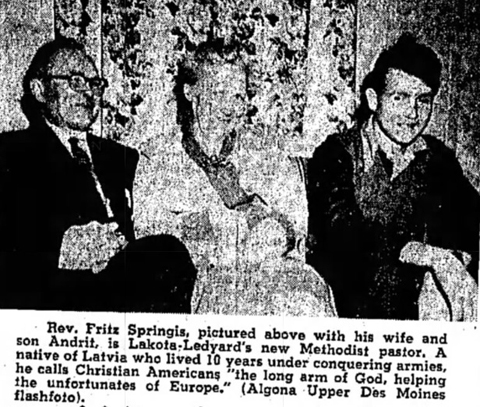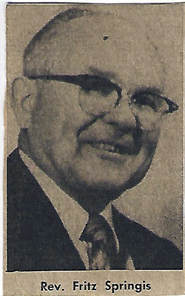The Algona Upper DesMoines (Algona, Iowa) Tuesday, February 26, 1952

Photo Caption: Rev. Fritz Springis, pictured above with his wife and son Andrit, is Lakota-Ledyard’s new Methodist pastor. A native of Latvia, who lived 10 years under conquering armies, he calls Christian Americans “the long arm of God, helping the unfortunates of Europe.” (Algona Upper Des Moines flashfoto.)
* * *
By Paul Schenck
When Lakota-Ledyard’s new Methodist pastor stops laughing, it’s to say that he is “laughing from joy at being in God’s great country – America.”
After years of fleeing from conquering armies, “it seems more like a fairy tale” that this Latvian native and his family should be safe in the United States, and he is starting work in his new pastorate.
And so he laughs – laughs because he is overjoyed; laughs because he is naturally good-natured and jovial; and laughs because that is the best way to remember part of the past.
Rev. Fritz Springis, new Methodist minister in the Lakota and Ledyard churches, lived three years funder Russian Communism, three years under German Fascism, and four years in the British-controlled West German sector. With those 10 years of memories, he takes real pride in swearing allegiance to the United States flag.
Refused Fascist Pledge
Rev. Springis and his family were happy in the Latvian home in Riga, the capital city, where he was an officer in the Ministry of Education until 1935. In that year he was ousted from his post because he refused to sign a loyalty pledge to the Fascist government, which swept over Latvia as it did all of Europe.
Trained in philosophy, he then became a minister of a Methodist church in Latvia.
Russian armies conquered the little Baltic country in 1941, and the Springis family fled. Since then, they have never seen their home, but know that Riga was almost completely destroyed in the war and that there is no reason to return.
Rev. Springis escaped to the forests, where he hid out, moving constantly from place to place. Under the Russian conquerors, the best and highest educated people can usually be found in the forests, he recounts.
Escaped Deportation.
The German armies marched through the Baltic countries, and Rev. Springis was again safe, not as a Methodist minister, but as a refugee from Communism.
But Hitler’s conquerors were driven back from Moscow, and Russians again invaded Latvia. Fleeing to East Germany, Rev. Springis and his family were safe only until the Russians swept over that country, too.
The refugee minister now jokes about his experiences as a Russian slave laborer. He was given an old horse and told to cut timber, to be shipped back to Russia. The ancient nag died, and the Reverend was charged with sabotaging the work detail, with penalty of deportation.
He escaped from Communistic police and fled to West Germany, in 1947, followed shortly by his family. Working there side by side with teachers and court judges as brick masons, they eked out a living.
Speaks 7 Languages.
Finally, on October 26, 1951, the family sailed from Rotterdam, the passage paid for by a Methodist church in Connecticut. Bishop Charles Brashares of DesMoines placed him at Humboldt, where he shadowed Rev. C. R. Buckwalter to learn the ways of Iowa Methodism.
Rev. Springis delivered his trial sermon at the Lakota-Ledyard churches, Jan. 28, and assumed the pastorate as of Feb. 1.
The minister and his family speak Latvian and German fluently, using either in their home conversations, as well as Russian, Swedish, Norwegian, Danish, English and now the American version of English. His three months in the country constitute his only practice in speaking English, although he studied it as a boy in Latvia.
His sermons and services are interesting, to say the least, but few realize the work that goes into them. He first writes the sermon, then laboriously rewrites and corrects the copy, using the English translation of the Bible as his grammar book.
“Americans go forward in everything but their language,” he declares. “Those silent letters that aren’t pronounced are the worst.” But the family is too happy here to have complaints, and is rapidly adopting American customs and habits.
Prefers Hitler to Stalin.
The one son, 16-year-old Andrit (pronounced Andray), is attending the Lakota school. In the eighth grade at Humboldt, he will probably be placed in high school in Lakota. At present, language is his greatest problem, too. Two older Springis children are still in Germany.
Looking back, Rev. Springis can say from experience, that he hates all forms of dictatorship, but of the two he has lived under, he would prefer Fascism to Communism: “Hitler’s gas chambers are better than Stalin’s slow death in slave labor.”
By Communistic standards, Rev. Springis is probably already a Capitalist. He now motors between Lakota and Ledyard in a newly acquired 1930 Model A auto – one more reason for him to laugh for joy in his adopted country.
* * * * * * * * * * * *
Wright County Monitor (Clarion, IA) - Thurs. March 19, 1953
Lakota Minister To Speak Sunday
Rev. Fritz Springis, pastor of the Methodist church in Lakota will speak at the Methodist church in Goldfield, next Sunday evening at 7:30 p.m. Pastor Springis will describe vividly from alarming personal experiences what it means to fall victim to the Russian Communist anti-religion persecution.
The speaker was a Methodist pastor in the former Baltic and Slavic annual conference of the Methodist church, which was dissolved in 1939 by the action of the totalitarian government of the U.S.S.R.
Pastor Springis served with devotion and sacrifice, beyond that required of most men, until imprisoned by the Russian conquerors of his native Latvia. He was condemned to be murdered and will relate how he was saved at the very last minute, but only to suffer imprisonment and discomfort until brought to the United States by the Methodist committee for the care of displaced persons. Befriended by the Rev. C. R. Buckwalter of Humboldt, who gave much personal time to teach him the English language, Pastor Springis is now in charge of the Methodist congregations of Lakota and Ledyard. * * * * * * * * * * * *
Kossuth County Advance (Algona IA)
Thursday, December 23, 1954
LAKOTA PASTOR WRITES of RUSSIA LABOR CAMP.
REFUGEE FROM SOVIET TELLS OF EXPERIENCE.
(Editor’s Note: The following story is reprinted from last week’s Bancroft Register and was written by the Rev. Fritz Springis, pastor of the Ledyard and Lakota Methodist churches. The Rev. Mr. Springis knows of what he writes as he spent several years in a forced labor camp in Russia.)
By Rev. Fritz Springis
Hey, get up, get up ye rabble—this is the beginning and greeting of a new day in a forced labor camp, somewhere in northern Russia. We do not know where we are because we were brought to this forest of horror in sealed box-cars and forced to march a long distance until we came to this camp.
This camp consists of a number of barracks made of boards, and massive log-houses for MVD officers and soldiers. All this complex is hedged with high barbed wire fence and has, in some distance one from another, high watch-towers armed with machineguns, and search lights. The barrack is a long and low building, it has doors in both ends and consists of one long room. Inside it has in the middle a way and both sides a two-story platform which serves as our beds. We are laying tight, man by man, to keep warm. There is an iron stove in the middle of the room, but it is not sufficient to keep the room warm, usually it is too hot in the nearness of the stove and cold in both ends of the room. By night we are kept under lock and key, but for our bodily needs there are four big sheet-iron buckets.
Our brotherhood of suffering consists of different nationalities and tongues even so of different social backgrounds. In our fellowship were simple farmers, whose only crime was that they owned a piece of soil. There were city tradesmen who had expressed their own opinion contrary to their Communist superiors; professors, teachers, ministers, lawyer, men and women –taken out of “circulation.”
Our daily task was to fell timbers and bring them to the wayside. All the work had to be done by hand, without any mechanical help, an inhuman heavy task. Our clothing is poor, and the weather is cold, our body is covered with painful eniloriams. We do not receive sufficient food—one-half pound rye bread daily and some kind of soup—that is all. All of us are weak and worn out. We do not have combs, neither razor-blades, nor do we have any opportunity to wash ourselves or our rags. We are sticky with dirt. We do not know what day or date it is—it does not interest us, either. We live in the past, remembrance of home and family is our only possession which no man can take away. At present all of us sigh: “How Long O Lord” in this sigh is expressed our faith, and our hope—it is our strength.
One evening as we returned from our work, somehow the rumors spread that it is CHRISTMAS EVE. It was like a spark for us. The past was called alive and we saw visions of long gone days. It was forbidden to stay in group and talk, but we were too excited to remember that. By and by somewhere in the barrack someone started silently to hum “Silent, Holy Night.” Pretty soon the tune was caught up by everyone and it grew to a mighty hymn to the Glory of God. The Watchmen rushed in and commanded silence. No one heard them. They started to slay the singers with the butt ends of their guns—but, the hymn grew mightier and then mightier. The search lights in the watch towers flashed up. The machine guns were put into action. Meanwhile, the hymn had been sung to its end. But in the eyes of MVD it was a riot—which has to be punished. The inhabitants of our barracks were driven outside and put up in one long row. . . . counted off and each number 10 had to step forward—and were shot before our eyes—to keep us in horror. From the depth of horrified hearts arose one great sigh to God: “How Long O Lord?”
_ _ _ _
Told in memory of those who lost their lives in persecution and in thankfulness for refuge in this free country where all human rights are respected and protected.—Rev. F. Springis.
* * * * * * * * * * * *
![]()





